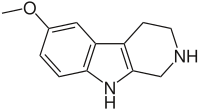ピノリン – Wikipedia
| ピノリン | |
|---|---|

|
|
|
6-Methoxy-1,2,3,4-tetrahydro-9H-pyrido[3,4-b]indole |
|
|
別称 6-MeO-THBC; 5-MeO-TLN; 6-methoxy-2,3,4,9-tetrahydro-1H-pyrido[3,4-b]indole; Pinoline; 6-Methoxy-2,3,4,9-tetrahydro-1H-β-carboline; 6-Methoxy-1,2,3,4-tetrahydro-β-carboline; 6-Methoxy-tetrahydronorharman; 6-Methoxy-2,3,4,9-tetrahydro-1H-β-carboline |
|
| 識別情報 | |
| CAS登録番号 | 20315-68-8 |
| PubChem | 1868 |
| ChemSpider | 1797 |
|
|
|
|
| 特性 | |
| 化学式 | C12H14N2O |
| モル質量 | 202.25 g mol−1 |
| 融点 |
216-224 °C, 265 K, -155 °F |
| 特記なき場合、データは常温 (25 °C)・常圧 (100 kPa) におけるものである。 | |
ピノリン(Pinoline)は、メトキシル化されたトリプトリン(5-メトキシトリプトミン)であり、長くメラトニンの代謝の過程で松果体にて生成されるとも言われているが決定的な説ではない[1]。IUPAC名はよく6-MeO-THBCと略記され、より一般的な呼び方は「松果体β-カルボリン」である[2]。この分子の生物活性としては、フリーラジカルのスカベンジャーとして、つまり、抗酸化物質としての関心が寄せられており[3]、モノアミン酸化酵素-Aの阻害剤でもある[4]。
ボシュロム社は2006年に、様々な眼科疾患を治療するための、この分子の薬剤送達装置の特許を出願している[5]。
目立った薬理特性のひとつは、試験管研究で神経発生を促す能力であり、それはごく微量でもみられている[6]。
アルミニウムの毒性は、脂質過酸化反応を増加させその大部分の損傷は脳内で生じる。研究のレビューでは、研究対象はヒトおよび動物の両方が含まれており、ピノリンとメラトニンがこの酸化反応を減少させるのに有効であることを示している[7]。
- ^ Barker, Steven A.. “LC/MS/MS analysis of the endogenous dimethyltryptamine hallucinogens, their precursors, and major metabolites in rat pineal gland microdialysate”. Biomedical Chromatography 27: 1690–1700. doi:10.1002/bmc.2981.
- ^ Callaway, James C.; Gyntber, Jukka; Poso, Antti; Airaksinen, Mauno M.; Vepsäläinen, Jouko (1994). “The pictet-spengler reaction and biogenic tryptamines: Formation of tetrahydro-β-carbolines at physiologicalpH”. Journal of Heterocyclic Chemistry 31 (2): 431. doi:10.1002/jhet.5570310231.
- ^ Schiller, Erich; Bartsch, H. (2003) (Google Books, page view). Free Radicals and Inhalation Pathology: Respiratory System, Mononuclear Phagocyte System, Hypoxia and Reoxygenation, Pneumoconioses, and Other Granulomatoses, Cancer. Springer. pp. 107. ISBN 978-3-540-00201-7 2009年2月14日閲覧。
- ^ Airaksinen, M. M., Huang, J. T., Ho, B. T., Taylor, D., and Walker, K. (1978). “The Uptake of 6-Methoxy-1,2,3,4-Tetrahydro-β-carboline and its Effect on 5-Hydroxytryptamine Uptake and Release in Blood Platelets”. Acta Pharmacol Toxicol 43 (5): 375–380. doi:10.1111/j.1600-0773.1978.tb02281.x.
- ^ Bartels, S. P. (2006) U.S. Patent No. 20,060,292,202 Washington, DC: U.S.
- ^ { Mario de la Fuente et al. 2015 “Neurogenic Potential Assessment and Pharmacological Characterization of 6-Methoxy-1,2,3,4-tetrahydro-β-carboline (Pinoline) and Melatonin–Pinoline Hybrids” http://pubs.acs.org/doi/abs/10.1021/acschemneuro.5b00041}
- ^ Mohammadir, Azadeh; Abdollahi, Mohammad (2011). “A Systematic Review on Oxidant/Antioxidant Imbalance in Aluminium Toxicity”. International Journal of Pharmacology 7: 12. doi:10.3923/ijp.2011.12.21.
Recent Comments